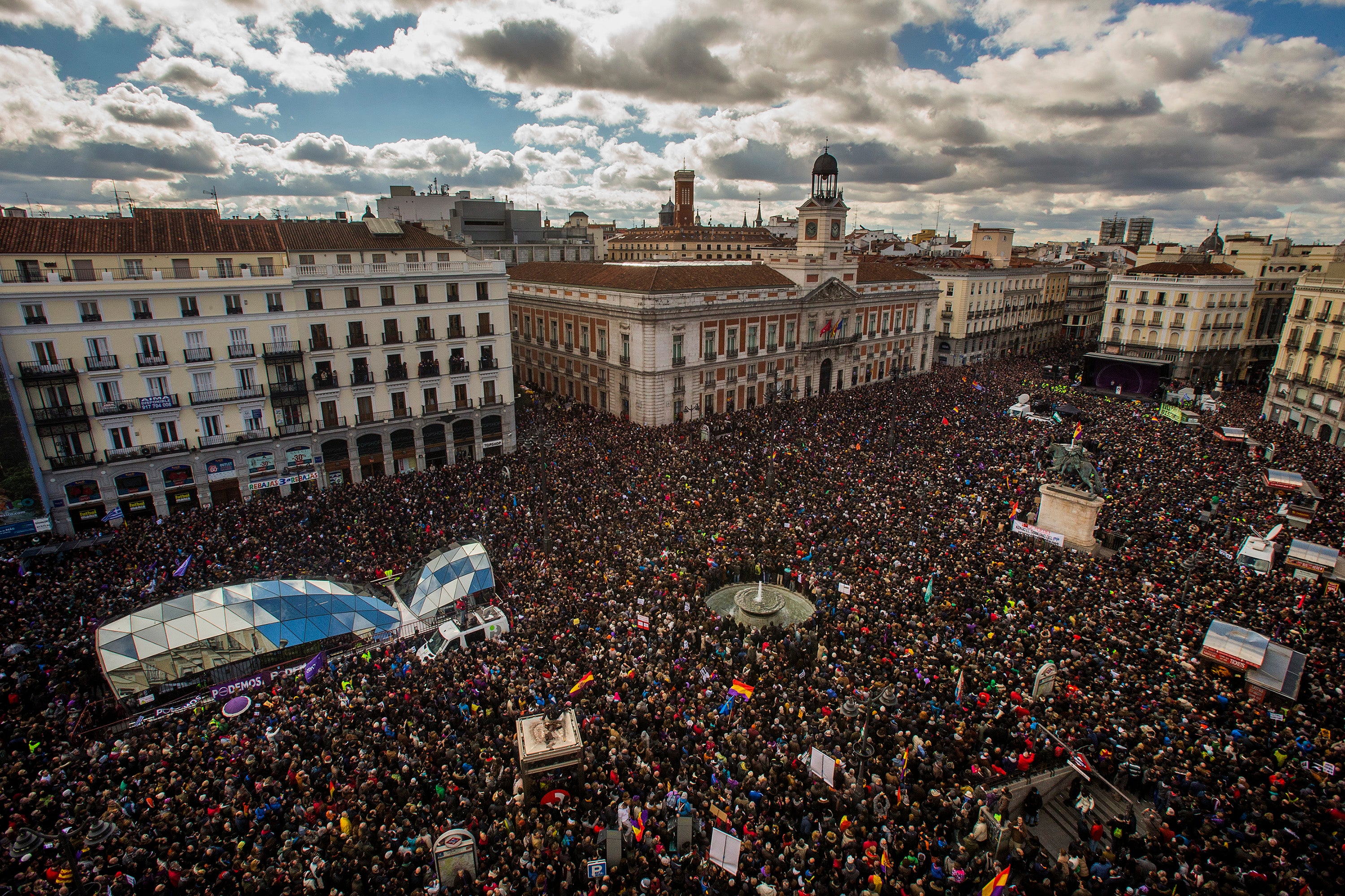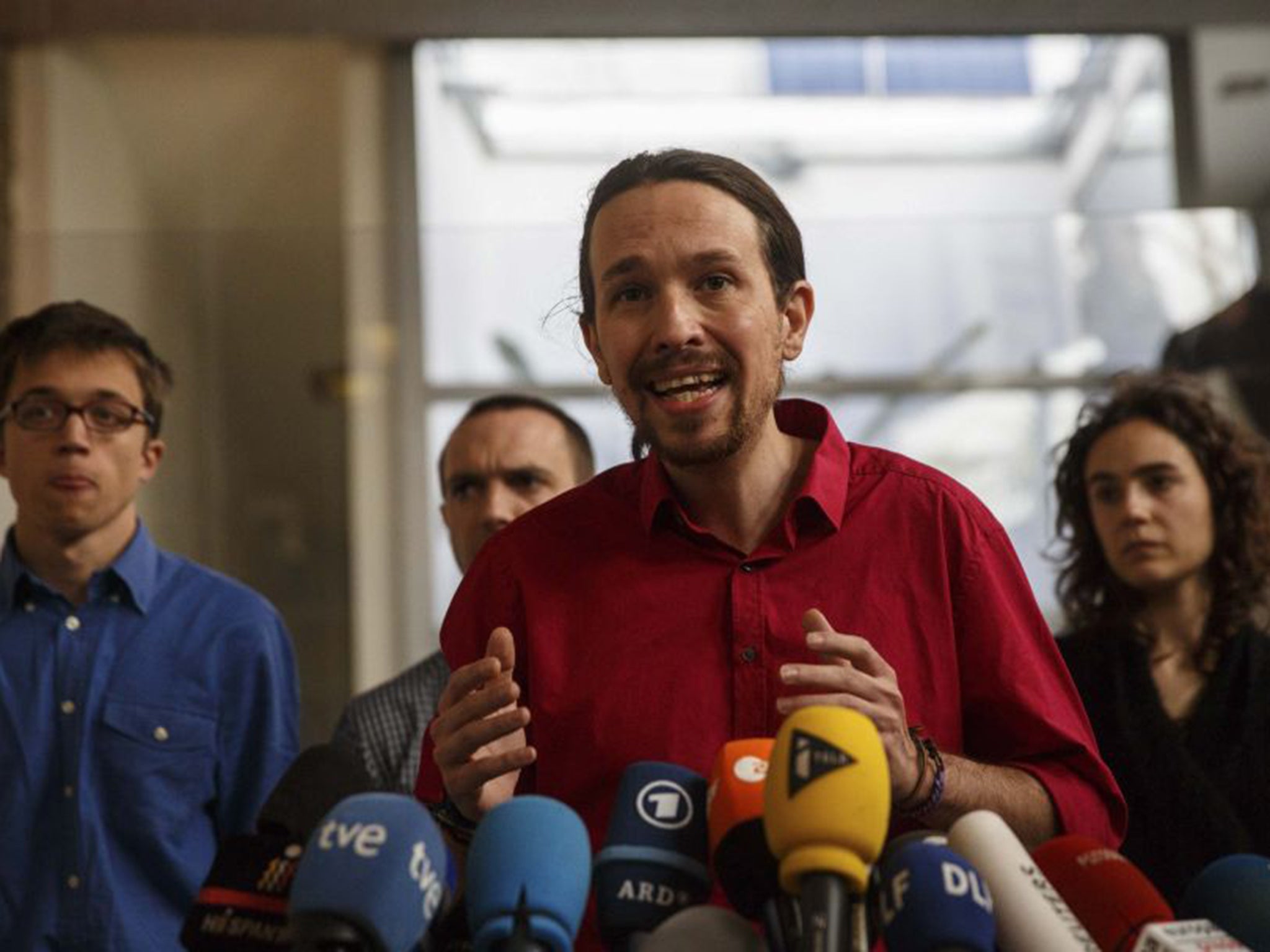Podemos March for Change: Huge crowds rally in Madrid to support Spanish leftist party
Tens of thousands gather, emboldened by 'sister party' Syriza's win in Greece

A week on from the seismic political shift delivered by the people of Greece, tens of thousands gathered in the Spanish capital today to tell their ruling elite that they too had had enough.
People of all ages, from babies carried by their mothers, to the elderly, came to express support for Podemos, a leftist, anti-austerity political party that is just 12 months old, and later this year is promising to end the dominance of Spain’s two main parties. Wearing the party’s purple and chanting “Yes, we can”, Spaniards from all walks of life turned out to show their support.
They came from across Spain in more than 260 buses that had been laid on for the “March of Change”, and from midday packed Madrid’s busiest central avenues around the square of Puerta del Sol – a hub for shoppers, tourists, and often protests too. Long before the speeches started, Sol was full, and many that had travelled from across the country found themselves jammed shoulder-to-shoulder in side streets.
Waving a Greek flag, one of the many in the crowd, Pablo Gonzalez, 32, a television director, said that voters in Greece had shown the way forward. “I hope we all do the same. In Ireland, Portugal and Spain. We should all follow what the Greeks have done,” he said.
“I am cross with Europe and with the political system here – it all has to change. We are all suffering. My pay has not risen for seven years, and many of my friends are losing their jobs. The situation just can’t go on.”
2015 is a year of elections in Spain, with regional and municipal polls across the country, culminating in a general election, probably in November. In some polls Podemos is already ahead of both the governing centre-right party, PP, and the traditional party of the left, PSOE, the original workers’ party.
Speaking to the crowds, which Spanish television later estimated could have run to hundreds of thousands, Podemos’s 36-year-old pony-tailed leader, Pablo Iglesias, said: “It’s exciting to see the people smile and speak with one giant united voice.
“These brave and humble people are the DNA of our party. Together we will win the elections and beat the PP.”
Speaking at a meeting in Barcelona, Prime Minister Mariano Rajoy said he didn’t accept the bleak picture of Spain that Podemos propagated. “They’re a sad bunch, who go around saying how badly things are going,” he said, according to the Associated Press.
Podemos has described Syriza, which romped to victory in Greece last weekend, as its “sister party” and several people held up signs saying, “Greece 10, Merkel 0,” a reference to the new Greek government’s intention to ignore the crippling conditions of Europe’s €240bn (£180bn) bailout.
And while there is anger in Spain at the bureaucrats in Brussels and Berlin who are accused of forcing austerity on the Spanish, the real resentment is reserved for their own political leaders and the broader establishment.
The PP is embroiled in a kickbacks scandal, in which its leaders are accused of being the beneficiaries of a slush fund. The King’s sister, Princess Cristina, is due to stand trial later this year on tax fraud charges – the first time a member of Spain’s royal family has faced criminal proceedings. Mr Gonzalez, the television director, said he had voted for the PSOE party in the past, but now regarded them as part of the same tired old elite.
With about one in four of the workforce unemployed, Podemos believes it has tapped into a rich vein of public wrath. Many see the party as being born out of the “Indignados” (outraged) movement, a ragtag coalition of groups that staged protests in 2011 and 2012 against the economic collapse felt in Spain and much of southern Europe. The Puerta del Sol was their protest spot of choice and home to sit-ins designed to highlight burgeoning job losses, home repossessions and cuts to public spending.
“This is not just about Podemos, it’s about society and the people,” said Paula Forstred, 50, a teacher. “Society has changed since the crisis and we are here to show the government that.”

Yet, as support for Podemos grows, so does the scrutiny of its policies and leaders. Mr Iglesias told the rally “we want change”, but acknowledged that, “I know that governing is difficult but those who have serious dreams can change things.”
Last week the spotlight fell on Juan Carlos Monedero, one of Podemos’s founders, over work he did for several Latin American governments. He denies allegations that he avoided tens of thousands of euros in tax.
Another problem for Podemos is that Spain’s economy is slowly coming to life. On Friday, official figures put quarterly growth for the last three months of 2014 at a better than expected 0.7 per cent, while unemployment is gradually falling. Spain’s leaders had been vocal all week, telling voters not to threaten the country’s economic recovery – now one of the strongest in the eurozone.
“If I had to make a prediction, I think people will see later in the year that unemployment is falling and think that the recovery is gathering pace,” said Tom Rogers, a senior eurozone economist at economic forecasters Oxford Economics in London. “They will see Podemos’s policy to repeal labour market reforms will mean fewer jobs.
“There is still little detail, but the party has outlined a more comprehensive economic manifesto, which would see it relax fiscal policy and repeal a number of the labour market reforms of recent years. In sum, it looks like what they are proposing would impinge on Spanish growth.”
All this means that the hurdles facing Podemos as it tries to convert the rally into electoral success are real. But after the radical left’s victory in Greece, and today’s massive show of support, huge political upheaval in Spain is not as fantastic as it once seemed.
Join our commenting forum
Join thought-provoking conversations, follow other Independent readers and see their replies
Comments